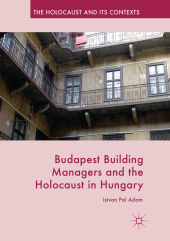 Neuerscheinungen 2018Stand: 2020-02-01 |
Schnellsuche
ISBN/Stichwort/Autor
|
Herderstraße 10
10625 Berlin
Tel.: 030 315 714 16
Fax 030 315 714 14
info@buchspektrum.de |

Istvan Pal Adam
Budapest Building Managers and the Holocaust in Hungary
Softcover reprint of the original 1st ed. 2016. 2018. xv, 204 S. 12 SW-Abb. 210 mm
Verlag/Jahr: SPRINGER, BERLIN; SPRINGER INTERNATIONAL PUBLISHING 2018
ISBN: 3-319-81613-6 (3319816136)
Neue ISBN: 978-3-319-81613-5 (9783319816135)
Preis und Lieferzeit: Bitte klicken
This book traces the role of Budapest building managers or concierges during the Holocaust. It analyzes the actions of a group of ordinary citizens in a much longer timeframe than Holocaust scholars usually do. Thus, it situates the building managers´ activity during the war against the background of the origins and development of the profession as a by-product of the development of residential buildings since the forming of Budapest. Instead of presenting a snapshot from 1944, it shows that the building managers´ wartime acts were influenced and shaped by their long-term social aspiration for greater recognition and their economic expectations. Rather than focusing solely on pre-war antisemitism, this book takes into consideration other factors from the interwar period, such as the culture of tipping. In Budapest, during June 1944, the Jewish residents were separated not into a single closed ghetto area, but by the authorities designating dispersed apartment buildings as ´ghetto houses´. The almost 2,000 buildings were spread throughout the entire city and the non-Jewish concierges serving in these houses represented the link between the outside and the inside world. The empowerment of these building managers happened as a side-effect of the anti-Jewish legislation and these concierges found themselves in an intermediary position between the authorities and the citizens.
1. Building Managers Caught in the Middle.- 2. The Ghettoization Period in Budapest.- 3. The History of the Ghetto Buildings.- 4. Building Managers as Bridges in the Community.
"Adam´s book is not ´only´ a fascinating reading about how Jewish-Gentile lives were intertwined in wartime Budapest. Importantly, by examining the life of concierges inside and outside... Adam contextualizes their actions (and inactions) vis-ŕ vis other actors and the Holocaust as an event. ... Adam´s book is a vital reminder of how anti-Jewish prejudices, but also lust for power and eagerness to climb the social ladder, enabled the persecution of a largely assimilated minority." (Hana Kubátová, H-Nationalism, H-Net Reviews, April, 2018)
"µdám´s study is illuminating because it highlights the sensibilities and motivations of local people, who, in their own incongruent ways, played a role in the implementation of the Holocaust at the local level. ... His book is to be celebrated for its courage, analytical clarity, and humaneness, qualities that will push Holocaust research forward into new, exciting territory." (Ilse Josepha Lazaroms, East Central Europe, Vol. 45, 2018)
"The large amount of evidences and the accurate work done in this study is the key element of the narration of an extremely hard episode of European story. The evidence-based method Palm uses allows the reader vibe with the crudeness of the lives stories included in the book with the rigor that characterized them. Definitely, this study can attract historian and educational researchers as well as any non-expert people in those disciplines." (Helena Prieto, HSE - Social and Education History, Vol. 7 (1), 2018)


